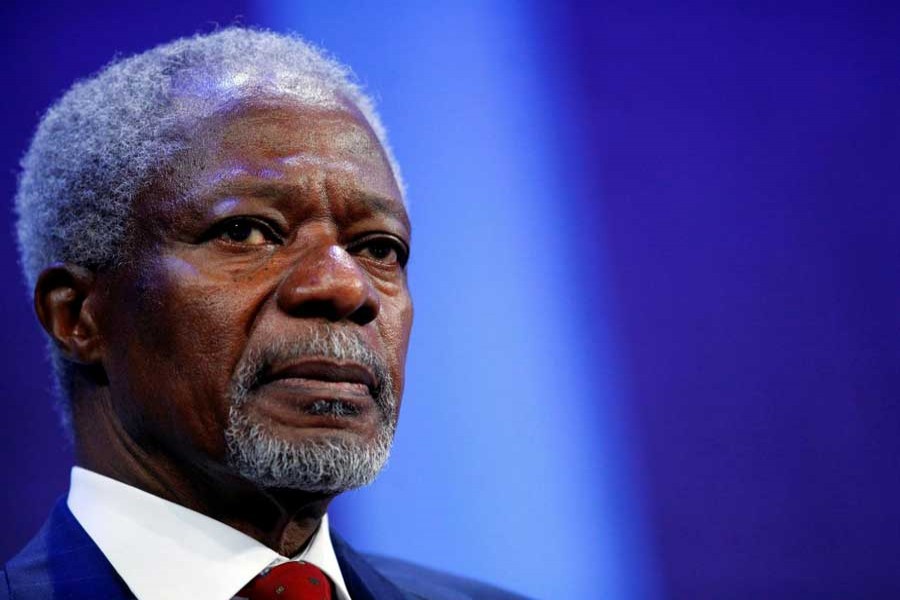Kofi Annan, former Secretary General of the United Nations (UN) passed away on August 18 in Bern, Switzerland after a brief illness.
Kofi Annan was the seventh secretary general of the United Nations and happened to be the first black African to ascend to the highest job of the world body. He led the United Nations for two terms from 1996 to 2006. His tenure was marked by the rise and fall of Taliban in Afghanistan, US-led invasion of Iraq and surge of insurgency in the Middle East.
Kofi Annan began his career with the World Health Organisation (WHO) and gradually moved up. He served several years at the United Nations High Commissioner for Refugees and witnessed the miseries of the uprooted people in different regions. On a special mission on the eve of the Gulf War, Annan successfully persuaded the Baghdad government to release hundreds of UN employees. He also facilitated the repatriation of hundreds of Asian workers from Iraq prior to the war. Boutros Boutros-Ghali, the Secretary General of the United Nations, pulled out Annan from the bureaucratic ranks and made him the Deputy Chief of the UN Peacekeeping in 1992.
In 1995, Annan oversaw the transfer of UN peacekeeping forces to the North Atlantic Treaty Organisation (NATO) after years of devastating ethnic conflict and his comments resonated the anguish felt by many for failing to end the bloodbath. Annan said, "In looking back we shall all record how we responded to the escalating horrors of the last four years. And as we do so, there are questions that each of us will have to answer. What did I do? Could I have done more? And could it have made a difference? Did I let my prejudice, my indifference and my fear overwhelm my reason? And how would I react next time?"
Boutros-Ghali's relation with Madeleine Albright, the US representative at the UN, soured on a number of issues and the US opposed his reappointment for the second term. Annan was nominated as replacement for Boutros-Ghali and the African members at the UN welcomed a black African to the highest UN job.
Taking lessons from the failures to stop the massacre in Srebrenica and Rwanda, Annan rejected the long-held notion that the UN could not interfere in the affairs of a member country. He persuaded the member countries that a government's suppression of its own people threatened international stability, making it appropriate for the Security Council to act.
Annan opposed the US-led invasion to Iraq and blamed the United States for its failure "to solve the problem by a collective decision". In an interview with the BBC, he termed the Iraq invasion "illegal". The Bush administration called Annan's observation as outrageous and "reeks of political interference".
Annan wanted to keep the channels open so that the United Nations could help the people of Iraq after the invasion. He appointed Sergio de Mello as special representative. But de Mello's terms of references were so encompassing that it became indistinguishable from the role of the US administrator Paul Bremmer. Consequently, the UN office in Baghdad was hit by insurgency, killing 21 UN officials including de Mello. Speaking at the General Assembly Annan said, "You send in some of your best people, who are your friends, and they were killed for trying to sort out the aftermath of the war you did not support; you can imagine my discouragement and melancholy. It was tough."
Addressing World Food Programme (WFP) Representatives in Copenhagen in 2006, Annan recalled that the UN was admonished for its failure to stop Iraq invasion while others criticised the UN for not endorsing the invasion. He said, "we were knocked by both sides." He added that millions of people in the United States and overseas demonstrated against Iraq invasion before a single bullet was shot but the Bush administration went ahead ignoring public opinion.
Soft-spoken Annan used to speak out what was in his mind fearlessly. Towards the end of his term, his relationship with Washington turned sour but he earned the admiration of the people around the globe. He would be remembered as one of the most charismatic secretary-generals of the United Nations.
Abdur Rahman Chowdhury is a former official of the United Nations.


